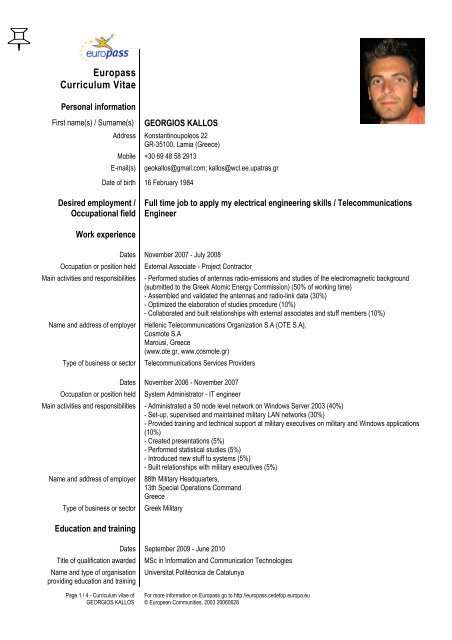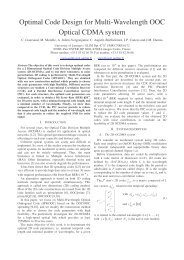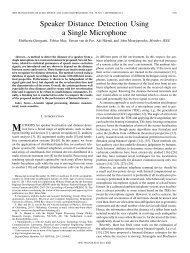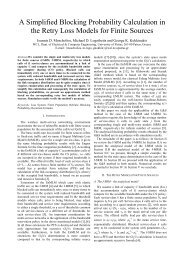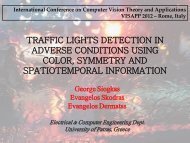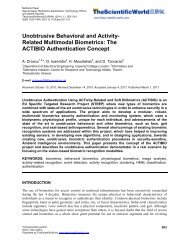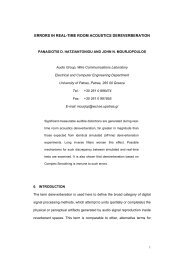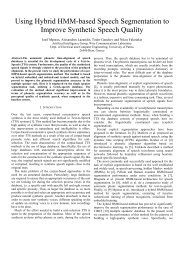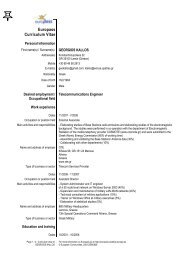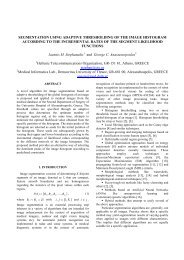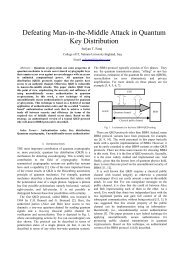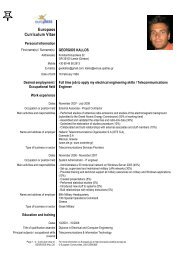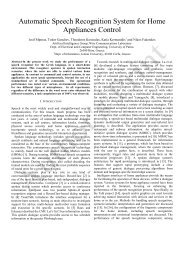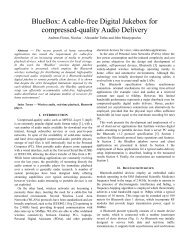Europass CV - Wire Communications Laboratory
Europass CV - Wire Communications Laboratory
Europass CV - Wire Communications Laboratory
You also want an ePaper? Increase the reach of your titles
YUMPU automatically turns print PDFs into web optimized ePapers that Google loves.
<strong>Europass</strong><br />
Curriculum Vitae<br />
Personal information<br />
First name(s) / Surname(s)<br />
GEORGIOS KALLOS<br />
Address Konstantinoupoleos 22<br />
GR-35100, Lamia (Greece)<br />
Mobile +30 69 48 58 2913<br />
E-mail(s)<br />
geokallos@gmail.com; kallos@wcl.ee.upatras.gr<br />
Date of birth 16 February 1984<br />
Desired employment /<br />
Occupational field<br />
Full time job to apply my electrical engineering skills / Telecommunications<br />
Engineer<br />
Work experience<br />
Occupation or position held<br />
Main activities and responsibilities<br />
Name and address of employer<br />
Type of business or sector<br />
Occupation or position held<br />
Dates November 2007 - July 2008<br />
External Associate - Project Contractor<br />
- Performed studies of antennas radio-emissions and studies of the electromagnetic background<br />
(submitted to the Greek Atomic Energy Commission) (50% of working time)<br />
- Assembled and validated the antennas and radio-link data (30%)<br />
- Optimized the elaboration of studies procedure (10%)<br />
- Collaborated and built relationships with external associates and stuff members (10%)<br />
Hellenic Telecommunications Organization S.A (OTE S.A),<br />
Cosmote S.A<br />
Marousi, Greece<br />
(www.ote.gr, www.cosmote.gr)<br />
Telecommunications Services Providers<br />
Dates November 2006 - November 2007<br />
System Administrator - IT engineer<br />
Main activities and responsibilities - Administrated a 50 node level network on Windows Server 2003 (40%)<br />
- Set-up, supervised and maintained military LAN networks (30%)<br />
- Provided training and technical support at military executives on military and Windows applications<br />
(10%)<br />
- Created presentations (5%)<br />
- Performed statistical studies (5%)<br />
- Introduced new stuff to systems (5%)<br />
- Built relationships with military executives (5%)<br />
Name and address of employer<br />
Type of business or sector<br />
Education and training<br />
Title of qualification awarded<br />
Name and type of organisation<br />
providing education and training<br />
88th Military Headquarters,<br />
13th Special Operations Command<br />
Greece<br />
Greek Military<br />
Dates September 2009 - June 2010<br />
MSc in Information and Communication Technologies<br />
Universitat Politècnica de Catalunya<br />
Page 1 / 4 - Curriculum vitae of<br />
GEORGIOS KALLOS<br />
For more information on <strong>Europass</strong> go to http://europass.cedefop.europa.eu<br />
© European Communities, 2003 20060628
, Barcelona (Spain)<br />
Dates September 2008 - June 2009<br />
Title of qualification awarded<br />
Principal subjects / occupational skills<br />
covered<br />
Name and type of organisation<br />
providing education and training<br />
Msc in <strong>Wire</strong>less Systems<br />
Physical layer of wireless communications, leadership in cross-cultural context, wireless & mobile<br />
network architectures, convex optimization in engineering applications, tele-economics<br />
Royal Institute of Technology (KTH)<br />
Stockholm (Sweden)<br />
Dates 10/2001 - 10/2006<br />
Title of qualification awarded<br />
Principal subjects / occupational skills<br />
covered<br />
Name and type of organisation<br />
providing education and training<br />
Diploma in Electrical and Computer Engineering<br />
Telecommunications & Information Technology<br />
University of Patras, Patras, Greece (University of Patras, Patras, Greece)<br />
Dates 04 July 2005 - 13 July 2005<br />
Title of qualification awarded<br />
Principal subjects / occupational skills<br />
covered<br />
Name and type of organisation<br />
providing education and training<br />
Seminar<br />
Terrestrial & Satellite <strong>Wire</strong>less <strong>Communications</strong><br />
Institute for Space Applications & Remote Sensing, National Observatory of Athens (Institute for<br />
Space Applications & Remote Sensing, National Observatory of Athens)<br />
Personal skills and<br />
competences<br />
Mother tongue(s)<br />
Other language(s)<br />
Self-assessment Understanding Speaking W r i t i n g<br />
European level (*) Listening Reading Spoken interaction Spoken production<br />
English C1 Proficient user C2 Proficient user B2 Independent user C1 Proficient user C1 Proficient user<br />
German A2 Basic User B1 Independent user A1 Basic User A1 Basic User A2 Basic User<br />
(*) Common European Framework of Reference (CEF) level<br />
Social skills and competences<br />
Organisational skills and competences<br />
Technical skills and competences<br />
Page 2 / 4 - Curriculum vitae of<br />
GEORGIOS KALLOS<br />
• Participations in conferences and meetings about wireless communications, globalization and the<br />
technological developments in Electrical Engineering allowed me to explore my interest in new ideas<br />
and state of the art technologies<br />
• Cooperative team worker in cross cultural environment; worked in multi-cultural teams during many<br />
Msc projects with people with different technical and social backgrounds<br />
• Adaptive to new environments and challenges; For the dual degree agreement I managed to adapt<br />
to two academic and social environments in Stockholm Sweden and in Barcelona Spain<br />
• While offering military service I acquired experience in handling classified information and built<br />
relationships with military executives;<br />
• Being part of a team of external associates at OTE S.A I was involved in a project with two<br />
collaborating companies in the greek telecom industry and gained experience in project management<br />
and team co-ordination;<br />
• My work at OTE S.A allowed me to organize and manage different aspects of a licensing procedure<br />
• As a research associate at the ECE department of the University of Patras, I developed<br />
computational algorithms and implemented simulation models for the estimation of QoS indicators in<br />
ATM networks and mobile UMTS and HSPA networks;<br />
• During Msc projects I gained experience in modeling wireless systems with Matlab and measuring<br />
For more information on <strong>Europass</strong> go to http://europass.cedefop.europa.eu<br />
© European Communities, 2003 20060628
the performance (implemented radio resource management algorithms and measured the QoS)<br />
Computer skills and competences<br />
Other skills and competences<br />
Additional information<br />
• Systems (Windows, Windows Office)<br />
• Languages - Software (Fortran, Matlab, C, Simscript, Java, UML, MySQL, Prolog, Mathcad,<br />
Labview)<br />
• Research associate at the <strong>Wire</strong> <strong>Communications</strong> <strong>Laboratory</strong> of the ECE Department, University of<br />
Patras, Greece (2006 - Today)<br />
The research focuses on performance modeling of mobile networks (WCDMA-UMTS, HSPA), network<br />
planning, optimization, traffic management and congestion control<br />
• Publications<br />
http://www.wcl.ece.upatras.gr/teletraffic/gkallos<br />
• Diploma Thesis (2006)<br />
"Study of the QoS of UMTS networks"<br />
• Participations<br />
- Communication Systems, Networks and Digital Signal Proccesing (CSNDSP ‘06) Fifth International<br />
Symposium 19-21 July, 2006 Electrical and Computer Engineering Department University of Patras,<br />
Patras, Greece (7/2006)<br />
- Oral presentation at IARIA 4th Advanced International Conference on Telecommunications, AICT<br />
2008, Athens, Greece, 8-13 June 2008<br />
• Memberships<br />
Member of the Technical Chamber of Greece<br />
• References available upon request<br />
Page 3 / 4 - Curriculum vitae of<br />
GEORGIOS KALLOS<br />
For more information on <strong>Europass</strong> go to http://europass.cedefop.europa.eu<br />
© European Communities, 2003 20060628
U<br />
N<br />
D<br />
E<br />
R<br />
S<br />
T<br />
A<br />
N<br />
D<br />
I<br />
N<br />
G<br />
Listening<br />
Reading<br />
EUROPEAN LANGUAGE LEVELS - SELF ASSESSMENT GRID<br />
A1 A2 B1 B2 C1 C2<br />
I can understand familiar words and very<br />
basic phrases concerning myself, my<br />
family and immediate concrete<br />
surroundings when people speak slowly<br />
and clearly.<br />
I can understand familiar names, words<br />
and very simple sentences, for example<br />
on notices and posters or in catalogues.<br />
I can understand phrases and the highest<br />
frequency vocabulary related to areas of<br />
most immediate personal relevance (e.g.<br />
very basic personal and family<br />
information, shopping, local area,<br />
employment). I can catch the main point<br />
in short, clear, simple messages and<br />
announcements.<br />
I can read very short, simple texts. I can<br />
find specific, predictable information in<br />
simple everyday material such as<br />
advertisements, prospectuses, menus<br />
and timetables and I can understand<br />
short simple personal letters.<br />
I can understand the main points of clear<br />
standard speech on familiar matters<br />
regularly encountered in work, school,<br />
leisure, etc. I can understand the main<br />
point of many radio or TV programmes on<br />
current affairs or topics of personal or<br />
professional interest when the delivery is<br />
relatively slow and clear.<br />
I can understand texts that consist mainly<br />
of high frequency everyday or job-related<br />
language. I can understand the<br />
description of events, feelings and wishes<br />
in personal letters.<br />
I can understand extended speech and<br />
lectures and follow even complex lines of<br />
argument provided the topic is<br />
reasonably familiar. I can understand<br />
most TV news and current affairs<br />
programmes. I can understand the<br />
majority of films in standard dialect.<br />
I can read articles and reports concerned<br />
with contemporary problems in which the<br />
writers adopt particular attitudes or<br />
viewpoints. I can understand<br />
contemporary literary prose.<br />
I can understand extended speech even<br />
when it is not clearly structured and when<br />
relationships are only implied and not<br />
signalled explicitly. I can understand<br />
television programmes and films without<br />
too much effort.<br />
I can understand long and complex<br />
factual and literary texts, appreciating<br />
distinctions of style. I can understand<br />
specialised articles and longer technical<br />
instructions, even when they do not relate<br />
to my field.<br />
I have no difficulty in understanding any<br />
kind of spoken language, whether live or<br />
broadcast, even when delivered at fast<br />
native speed, provided. I have some time<br />
to get familiar with the accent.<br />
I can read with ease virtually all forms of<br />
the written language, including abstract,<br />
structurally or linguistically complex texts<br />
such as manuals, specialised articles and<br />
literary works.<br />
S<br />
P<br />
E<br />
A<br />
K<br />
I<br />
N<br />
G<br />
Spoken<br />
interaction<br />
Spoken<br />
production<br />
I can interact in a simple way provided<br />
the other person is prepared to repeat or<br />
rephrase things at a slower rate of<br />
speech and help me formulate what I'm<br />
trying to say. I can ask and answer<br />
simple questions in areas of immediate<br />
need or on very familiar topics.<br />
I can use simple phrases and sentences<br />
to describe where I live and people I<br />
know.<br />
I can communicate in simple and routine<br />
tasks requiring a simple and direct<br />
exchange of information on familiar topics<br />
and activities. I can handle very short<br />
social exchanges, even though I can't<br />
usually understand enough to keep the<br />
conversation going myself.<br />
I can use a series of phrases and<br />
sentences to describe in simple terms my<br />
family and other people, living conditions,<br />
my educational background and my<br />
present or most recent job.<br />
I can deal with most situations likely to<br />
arise whilst travelling in an area where<br />
the language is spoken. I can enter<br />
unprepared into conversation on topics<br />
that are familiar, of personal interest or<br />
pertinent to everyday life (e.g. family,<br />
hobbies, work, travel and current events).<br />
I can connect phrases in a simple way in<br />
order to describe experiences and<br />
events, my dreams, hopes and ambitions.<br />
I can briefly give reasons and<br />
explanations for opinions and plans. I can<br />
narrate a story or relate the plot of a book<br />
or film and describe my reactions.<br />
I can interact with a degree of fluency and<br />
spontaneity that makes regular<br />
interaction with native speakers quite<br />
possible. I can take an active part in<br />
discussion in familiar contexts,<br />
accounting for and sustaining my views.<br />
I can present clear, detailed descriptions<br />
on a wide range of subjects related to my<br />
field of interest. I can explain a viewpoint<br />
on a topical issue giving the advantages<br />
and disadvantages of various options.<br />
I can express myself fluently and<br />
spontaneously without much obvious<br />
searching for expressions. I can use<br />
language flexibly and effectively for social<br />
and professional purposes. I can<br />
formulate ideas and opinions with<br />
precision and relate my contribution<br />
skilfully to those of other speakers.<br />
I can present clear, detailed descriptions<br />
of complex subjects integrating subthemes,<br />
developing particular points and<br />
rounding off with an appropriate<br />
conclusion.<br />
I can take part effortlessly in any<br />
conversation or discussion and have a<br />
good familiarity with idiomatic<br />
expressions and colloquialisms. I can<br />
express myself fluently and convey finer<br />
shades of meaning precisely. If I do have<br />
a problem I can backtrack and restructure<br />
around the difficulty so smoothly that<br />
other people are hardly aware of it.<br />
I can present a clear, smoothly-flowing<br />
description or argument in a style<br />
appropriate to the context and with an<br />
effective logical structure which helps the<br />
recipient to notice and remember<br />
significant points.<br />
W<br />
R<br />
I<br />
T<br />
I<br />
N<br />
G<br />
W r i t i n g<br />
I can write a short, simple postcard, for<br />
example sending holiday greetings. I can<br />
fill in forms with personal details, for<br />
example entering my name, nationality<br />
and address on a hotel registration form.<br />
I can write short, simple notes and<br />
messages. I can write a very simple<br />
personal letter, for example thanking<br />
someone for something.<br />
I can write simple connected text on<br />
topics which are familiar or of personal<br />
interest. I can write personal letters<br />
describing experiences and impressions.<br />
I can write clear, detailed text on a wide<br />
range of subjects related to my interests.<br />
I can write an essay or report, passing on<br />
information or giving reasons in support<br />
of or against a particular point of view. I<br />
can write letters highlighting the personal<br />
significance of events and experiences.<br />
I can express myself in clear, wellstructured<br />
text, expressing points of view<br />
at some length. I can write about complex<br />
subjects in a letter, an essay or a report,<br />
underlining what I consider to be the<br />
salient issues. I can select a style<br />
appropriate to the reader in mind.<br />
I can write clear, smoothly-flowing text in<br />
an appropriate style. I can write complex<br />
letters, reports or articles which present a<br />
case with an effective logical structure<br />
which helps the recipient to notice and<br />
remember significant points. I can write<br />
summaries and reviews of professional or<br />
literary works.<br />
© Council of Europe: Common European Framework of Reference for Languages (CEF)


